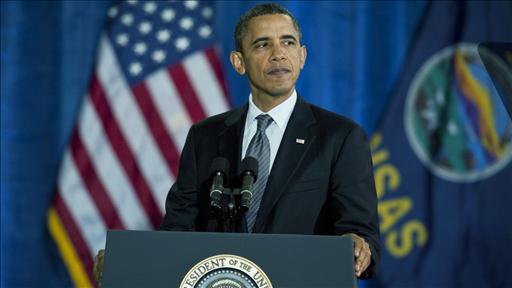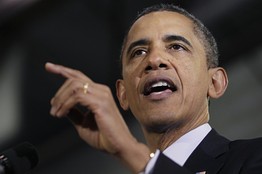Obama's Godfather Speech
The president sounds more like a Corleone than a Roosevelt.
By Daniel Henninger
WSJ.com
Most press accounts of Barack Obama's speech in Osawatomie, Kansas, Tuesday described it as delivered by the "president of the United States." And indeed the person delivering it analogized himself to Presidents Teddy Roosevelt, Franklin Roosevelt, Dwight Eisenhower and Bill Clinton. In fact, the Osawatomie speech was not given by the President of the United States. It was given by the leader of the Democratic Party.
Most of the time, this distinction isn't a problem in the United States because historically people have tended to think that the office of the presidency represents "all the people." This doesn't mean everyone expects to benefit from a president's policies. What it means is that in some informal way no one has to worry that the presidential motorcade, so to speak, will drive off the road so that it can plow into you. That is no longer the case in the U.S.
The Osawatomie speech sounded like what you'd expect to hear in Caracas or Buenos Aires. As in: "The free market has never been a license to take whatever you can from whomever you can." (Applause.) And: "Their philosophy is simple. We are better off when everybody is left to fend for themselves and play by their own rules."
Some will say hearing crude Chavista populism in the Obama speech is an overreaction. That once it's understood the Kansas speech was the work of the party leader, not the president of the United States, it becomes easier to think about it without overreacting to its intense and vivid rhetoric: "Millions of working families in this country . . . are now forced to take their children to food banks for a decent meal."
Mr. Obama, the bloodless political analysis of the speech runs, was just rallying his base. He needs to. Last month, in an election for state offices in Virginia, which Mr. Obama carried in 2008, Democrats turned out poorly, and Republicans won at every level of government, even in "independent" northern Virginia.
Democrats are depressed about the awful economy we've had the past three years. In Mr. Obama's view, this is a coincidence; the bad economy happened during his term because of mistakes someone else made in 2001 and 2003. Lest the base confuse his policies with someone else's, Mr. Obama needs to transform Democratic depression into some form of Democratic energy. This week, and apparently in the election next year, he has chosen a strategy based on fear and loathing of an opposition he identifies simply as, "They." "They argue, even if prosperity doesn't trickle down, well, that's the price of liberty."
About two-thirds through Mr. Obama's Kansas speech, I started to think of "The Godfather." After slapping around the "wealthy" for about a half hour, Mr. Obama said, "This isn't about class warfare." Maybe that's true. In "The Godfather," when awful things are about to be done to people, Michael Corleone or Tom Hagen reassure those about to get hit, "It's not personal; it's strictly business."
But I could be wrong about that. There is that defining moment when Michael Corleone says to Fredo, his brother, "You're nothing to me now." When even as party leader, a president of the United States gives a major speech in which people get singled out repeatedly as basically enemies of "the middle class," one has to wonder if they are nothing to him.
You then have to wonder about the tenor of another Obama term in office. If in fact there are categories of Americans he simply doesn't like, a second Obama term, like the last half of "Godfather II," could be a clinical exercise in hammering the people he singled out in this speech. Metaphorically speaking.
The Kansas speech was built around one concrete policy idea: that the rich and millionaires (officially still defined as families with before-tax income above $250,000) should send him more money so he can "invest" it. This single policy, if we heard correctly, will end high unemployment, raise middle-class incomes, put children through college, make America fair and defeat countries that pollute.
But will it?
Mr. Obama says everyone has to play by his new rules: "Unless you're a financial institution whose business model is built on breaking the law, cheating consumers and making risky bets that could damage the entire economy, you should have nothing to fear from these new rules." Really? Citigroup on Thursday said it will eliminate 4,500 jobs. In the third quarter alone, 2,500 U.S. banks cut 20,332 jobs. Let 'em go. In the coming Obama economy, they can "make wind turbines and . . . high-powered batteries."
What the Democratic base would get out of an Obama re-election is political power, which counts for something. It lets you tell other people what to do. But nothing in that Kansas speech, especially the wealth taxes, will produce real growth in the dry economy America has had for three years. Strong growth is the only solution to the Osawatomie catalog of horrors. If he wins, five years from now, the president's base will be about where it and nearly everyone else is today, trying to stay afloat in Barack Obama's still waters.
Write to henninger@wsj.com



